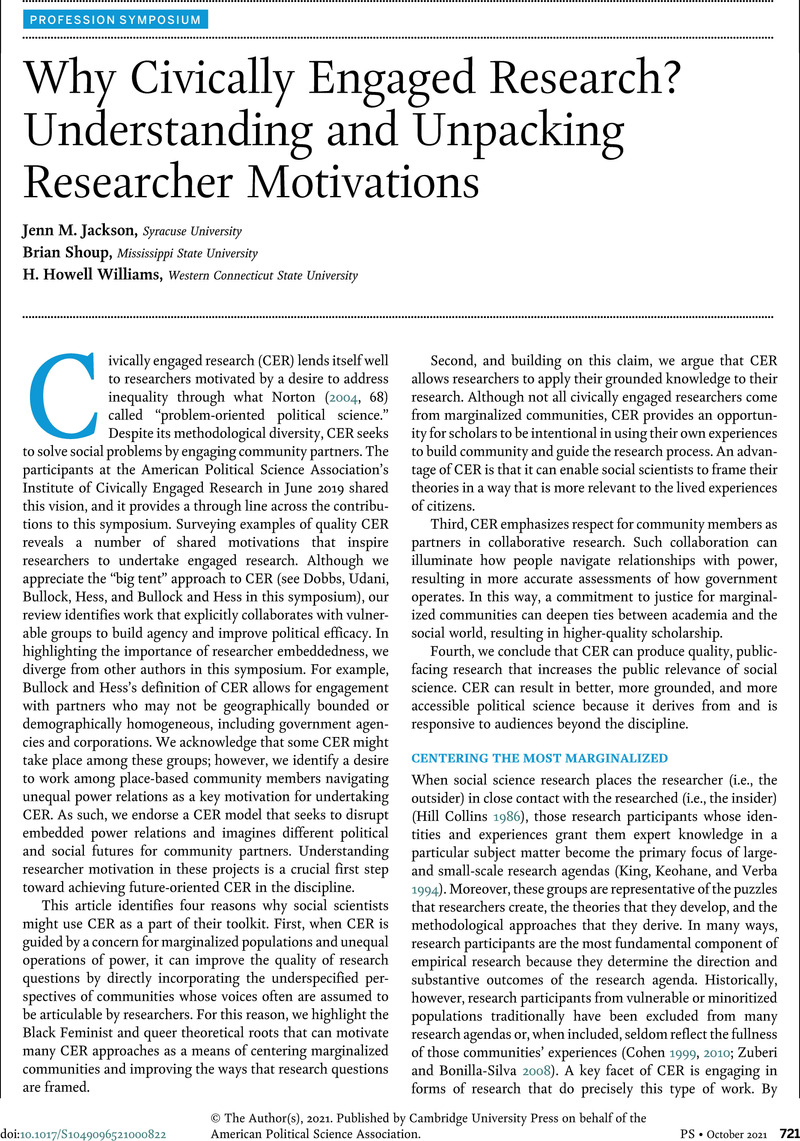Crossref Citations
This article has been cited by the following publications. This list is generated based on data provided by Crossref.
Nwakanma, Adaugo Pamela
2023.
Theorizing justice from the margins: Black feminist insights on political (protest) behavior.
Politics, Groups, and Identities,
Vol. 11,
Issue. 5,
p.
1190.
Unidos, Migrantes
Udani, Adriano
Torres Wedding, Maria
Flores Fontanez, Ángel
John, Sara
and
Seleyman, Allie
2024.
Envisioning a world without prisons: group concept mapping as a collective strategy for justice and dignity.
Politics, Groups, and Identities,
Vol. 12,
Issue. 5,
p.
1012.
Mitra, Ankushi
McNew-Birren, Jill
and
Nickels, Ashley E.
2024.
Who counts in civically engaged research? Rethinking expertise and authority in politics.
Politics, Groups, and Identities,
p.
1.
Chan, Stephanie
Reichert, Frank
and
Krewson, Rosa Castillo
2024.
Vulnerability as identity facet: reconceptualizing vulnerability to conduct civically engaged research.
Politics, Groups, and Identities,
p.
1.
Reyna, Veronica Lynn
Chaffin, LaTasha
and
Burbridge, Chris
2024.
Best practices: CER with vulnerable populations in contentious political environments.
Politics, Groups, and Identities,
p.
1.
Bautista-Chavez, Angie
Castañeda-Pérez, Estefanía
Chan, Stephanie
and
Mitra, Ankushi
2024.
Hierarchy in the Politics of Migration: Revisiting Race, Ethnicity, and Power in the Migration State.
International Migration Review,
Vol. 58,
Issue. 4,
p.
2066.
Mitra, Ankushi
Kline, Curtis
and
Bautista-Chavez, Angie M.
2024.
Civically engaged research in political science: a methodological guide.
Politics, Groups, and Identities,
p.
1.
Nelson, John P
2024.
The micro-dynamics of scientific choice: research project motivations among public affairs academics.
Science and Public Policy,
Vol. 51,
Issue. 1,
p.
149.
Udani, Adriano
and
Torres Wedding, Maria
2025.
The Case for accompaniment in struggles against the state: designing ethically sensible and response research partnerships in political science.
Politics, Groups, and Identities,
p.
1.
Rice, Laurie L.
Sharrow, Elizabeth
and
Martinez-Ebers, Valerie
2025.
From public engagement to civically engaged research.
Politics, Groups, and Identities,
p.
1.
Reichert, Frank
Rice, Laurie L.
and
Do, Nhat-Dang
2025.
Methodological pluralism in civically engaged research.
Politics, Groups, and Identities,
p.
1.
Davies, Elizabeth Jordie
2025.
Dear political science: tools for the study of black (life and) politics.
Politics, Groups, and Identities,
p.
1.
Bryan, Sarah
Chapa, Samantha
and
Rauen, Alexia
2025.
Experiences of immigrant survivors of violence with law enforcement.
Politics, Groups, and Identities,
p.
1.



